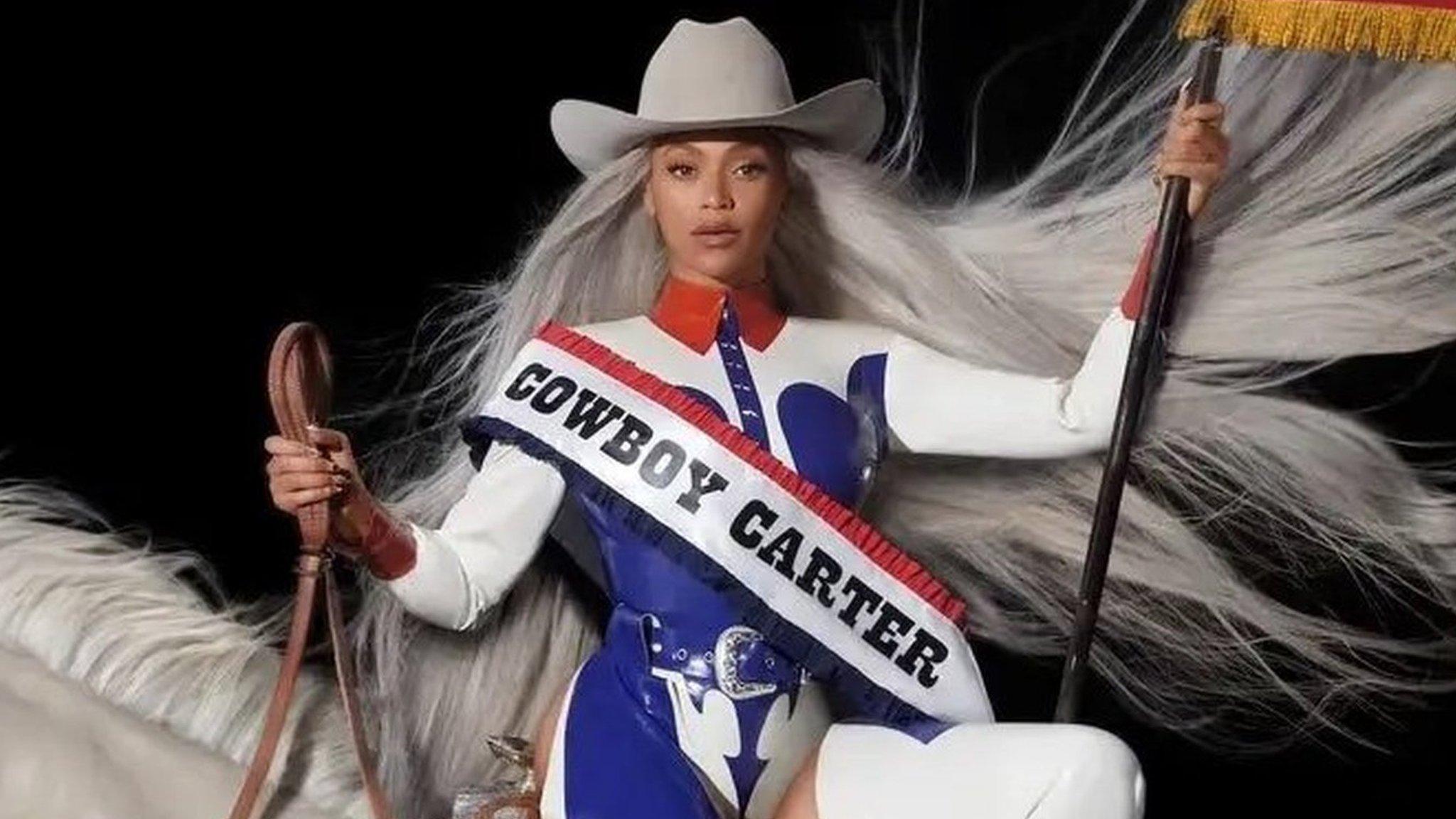Beyoncé album is missing tracks on vinyl, fans say
- Published

Beyoncé's album Cowboy Carter has been met with universal acclaim from critics
Fans who pre-ordered Beyoncé's latest album on vinyl are reporting that five of its tracks have gone missing.
Cowboy Carter was released to critical acclaim on Friday, with reviews calling it a "masterpiece" and a "slick and starry Western epic".
But some of the best-received songs, including Ya Ya and Spaghetti, are reportedly not present on the vinyl edition.
The BBC has contacted Beyoncé's representatives for comment.
"I'm so sad," wrote one fan on Reddit, who would have paid £32 to pre-order the copy album from Beyoncé's website.
"It's such a shame, because Ya Ya is up there with my top five favourite songs" on the album, said vinyl collectors Matt and Juan on TikTok. , external
The songs and interludes reported missing are: Spaghetti, Flamenco, The Linda Martell Show, Ya Ya and Oh Louisiana.
It is not clear whether all vinyl copies are affected. Fans have also reported that CD copies are missing four tracks.
"What is up with that?! How could she sell an incomplete album?" complained one on Reddit.
The likely explanation is that Beyoncé added these songs late into the album's creation.
Vinyl pressing plants are booked months in advance, with lead times of 10 weeks to six months - meaning albums have to be submitted long in advance of their release.
But it is also not unusual for artists to tweak track lists and arrangements at the last minute.

Beyoncé has been wearing Rhinestones and Stetsons to signpost the country influences on her new album
Famously, Kanye West updated his 2016 album The Life Of Pablo several times after it was released, with songs updating on streaming services for weeks before he was finally satisfied.
Beyoncé also modified her previous album, Renaissance, in the week after its release, by changing a lyric to remove a slur commonly used to demean people with cerebral palsy.
In a press release issued on Friday, the star said Cowboy Carter had taken "over five years" to create.
"It's been really great to have the time and the grace to be able to take my time with it," she added, explaining that it was originally supposed to come out in 2022, as the first part of a planned trilogy.
Instead, she released the more dance-centric Renaissance as a response to the Covid-19 lockdown.
"With the pandemic, there was too much heaviness in the world," she said. "We wanted to dance. We deserved to dance. But I had to trust God's timing."
The suggestion that Cowboy Carter had been waiting in the wings for several years caused confusion, with fans demanding to know why their physical copies were incomplete.
"Address the mess. What happened?" said one, responding to a post on the official Beyoncé store Instagram account, external.
"We need at least a discount refund, or be able to refund altogether since the CDs and vinyls delivered are not what was listed," added a second.

An alternative cover for the album suggests it originally had a different title
Meanwhile, other fans have speculated that the star changed her album's title late in the day.
Instead of Cowboy Carter, the spine of the CD and vinyl copies is labelled "Act ii: Beyincé".
Sleuths in the Beyhive subsequently discovered that this is a reference to the star's ancestral surname: Her maternal grandparents were called Beyincé - but the spelling was changed on her mother Tina's birth certificate.
Speaking to Heather Thompson's In My Heart, external podcast in 2020, Tina said her mother, Angnéz Beyincé, had asked for the documents to be changed but was told, "Be happy that you're getting a birth certificate".
"Black people didn't get birth certificates. They didn't have certificates because it meant that you really didn't exist," Knowles said.
The story feeds into Cowboy Carter's narrative, which deals with the marginalisation of black people in country music and the American South.
It skilfully blends the sounds of country and American folk with hip-hop, pop and glistening funk, deliberately dismantling the idea of racial divides across musical genres.
In her press release, Beyoncé added that the album's organic sound was partially in response to the digital production techniques behind most modern pop albums - including her own.
"With artificial intelligence and digital filters and programming, I wanted to go back to real instruments, and I used very old ones," she said.
"I didn't want some layers of instruments like strings, especially guitars, and organs perfectly in tune. I kept some songs raw and leaned into folk. All the sounds were so organic and human, everyday things like the wind, snaps and even the sound of birds and chickens, the sounds of nature."
Related topics
- Published29 March 2024

- Published28 March 2024

- Published21 February 2024

- Published2 March 2024
